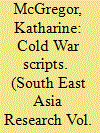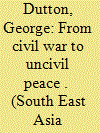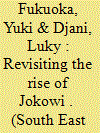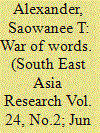|
|
|
Sort Order |
|
|
|
Items / Page
|
|
|
|
|
|
|
| Srl | Item |
| 1 |
ID:
146535


|
|
|
|
|
| Summary/Abstract |
This paper contributes to a growing field of literature on Cold War culture by comparing struggles over memory in Indonesia and Malaysia of anti-communist repressions. It demonstrates the enduring legacies of the Cold War in these neighbouring countries where the war overlapped directly with experiences of colonization and decolonization. I show how and why anti-communism in both countries became a core foundation of both Malaysian and Indonesian nationalism and related religious identification and how this largely explains successive governments’ attempts to memorialize and defend these repressions. I argue that recent attempts by both survivors of the repression and younger Indonesians and Malaysians to reexamine the history of the political left or experiences of repression constitute important efforts to rethink the postcolonial predicaments of both countries in different ways.
|
|
|
|
|
|
|
|
|
|
|
|
|
|
|
|
| 2 |
ID:
146536


|
|
|
|
|
| Summary/Abstract |
The democratization of politics has been accompanied by a rise of Islamic laws in many Muslim-majority countries. Despite a growing interest in the phenomenon, the Islamization of politics in democratizing Muslim-majority countries is rarely understood as a process that unfolds across space and time. Based on an original dataset established during years of field research in Indonesia, this article analyzes the spread of shari’a regulations across the world’s largest Muslim-majority democracy since 1998. The article shows that shari’a regulations in Indonesia diffused unevenly across space and time. Explanations put forward in the literature on the diffusion of morality policies in other countries such as geographic proximity, institutions, intergovernmental relations and economic conditions did not explain the patterns in the diffusion of shari’a regulations in Indonesia well. Instead, shari’a regulations in Indonesia were most likely to spread across jurisdictions where local Islamist groups situated outside the party system had an established presence. In short, the Islamization of politics was highly contingent on local conditions. Future research will need to pay more attention to local Islamist activists and networks situated outside formal politics as potential causes for the diffusion of shari’a law in democratizing Muslim-majority countries.
|
|
|
|
|
|
|
|
|
|
|
|
|
|
|
|
| 3 |
ID:
146531


|
|
|
|
|
| Summary/Abstract |
This article examines the role and prominence of the military as the key institution of the new Nguyen dynasty in Vietnam at the beginning of the 19th century. The military had brought the new regime to power during the wars with the Tay Son regime, and the end of the conflict did not end the military’s role. I argue, contrary to existing scholarship which emphasizes the Nguyen as a civilian bureaucratic regime, that the military remained critical to the survival of the new regime. While the Nguyen slowly began the transition to civil rule, the military remained the predominant institution of the dynasty well into the middle of the century. Moreover, I argue that the regime’s military orientation had profound effects on the Vietnamese populations who were subject to conscription and the associated hardships of labor projects and suppression of insurgencies.
|
|
|
|
|
|
|
|
|
|
|
|
|
|
|
|
| 4 |
ID:
146537


|
|
|
|
|
| Summary/Abstract |
This study investigates constructions of manliness in the late-colonial Netherlands Indies (1870s–1930s), with particular reference to the so-called ‘Sino-Malay’ novels and newspapers produced by its local-born, culturally hybrid Chinese population (Peranakan). These authors incorporated ideas from South East Asia as well as China and Europe in their works, providing insights in traditional notions of heteronormative manhood, but also exposing major reconfigurations of gender within the diverse conditions of modernity. Their writings thus provide an underexplored vista into a remarkably diverse society in transition. I will centre on words used in the Malay vernacular to characterize men and male behaviour. This serves as a springboard to explore three interconnected themes surrounding manliness in Sino-Malay publications: violence, sexuality, and modernity. As will be shown, several constructions of gender and manifestations of popular culture associated with modern Indonesia were rooted in the same discourse as these colonial-era works.
|
|
|
|
|
|
|
|
|
|
|
|
|
|
|
|
| 5 |
ID:
146533


|
|
|
|
|
| Summary/Abstract |
Just a few months into his first term, the new president of Indonesia, Jokowi, began to disappoint his supporters who had expected his presidency to enhance the quality of Indonesia’s dysfunctional democracy.1 Contrary to his campaign promise of establishing a ‘clean’ and ‘professional’ government without horse-trading, Jokowi granted strategic government positions to those with links to oligarchic interests, indicating that key decisions were largely dictated by his party patrons. Much of the literature, which has tended to portray the rise of Jokowi as a challenge to oligarchic interests, is not well placed to account for this ‘U-turn’. Against this backdrop, this article explores another dimension of Jokowi’s ascendance, arguing that it should also be understood in the broader context of oligarchic adaptation of ‘post-clientelist’ initiatives – measures to attract enlightened voters to compensate for increasingly ineffective clientelistic mobilisation. This is not to argue that Jokowi was simply made a ‘puppet’ of his patrons, but to suggest that more attention needs to be directed to the broader structural constraints placed on Jokowi in order to have a more nuanced understanding of the political context in which he must operate.
|
|
|
|
|
|
|
|
|
|
|
|
|
|
|
|
| 6 |
ID:
146534


|
|
|
|
|
| Summary/Abstract |
Thai grassroots activists known as ‘redshirts’ (broadly aligned with former prime minister Thaksin Shinawatra) have been characterised according to their socio-economic profile, but despite pioneering works such as Buchanan (2013), Cohen (2012) and Ünaldi (2014), there is still much to learn about how ordinary redshirts voice their political stances. This article is based on a linguistic approach to discourse analysis and builds on Fairclough’s (2003) arguments concerning the ways in which speakers use intertextuality and assumption to construct social and political difference and consensus. It specifically explores redshirt understandings of democracy by examining intertextuality and presupposition through various linguistic strategies. It sets out to answer these questions: What are grassroots redshirt protesters’ understandings of democracy? How do they articulate those understandings verbally? The study is based on an analysis of 12 interviews conducted in 2012 with grassroots redshirts from Ubon Ratchathani, Thailand. It shows how informants voiced notions of democracy by making explicit intertextual references and alluding to implicit meaning through presupposition. The results show that informants had a definite understanding of democracy despite a degree of contradiction, confusion and ambiguity. They also attempted to communicate political beliefs despite limits on their freedom of expression.
|
|
|
|
|
|
|
|
|
|
|
|
|
|
|
|
| 7 |
ID:
146532


|
|
|
|
|
| Summary/Abstract |
That the complexity of Malayan society, with its ethnically diverse population and its linguistic, cultural and religious differences, could be simply reduced to ‘practically three races’ that in turn bore three simple essential characteristics – idleness, criminality and drunkenness – is telling of how the order of knowledge and power that had dominated and defined the colony had also reduced its native inhabitants to stock caricatures that were permanently fixed and defined. Knowing the colonised native Other meant being in a position of epistemic leverage over that Other, and thus being able to define and frame the Other in whatever terms that suited the ideological needs of racialised colonial-capitalism at the time.
|
|
|
|
|
|
|
|
|
|
|
|
|
|
|
|
|
|
|
|
|